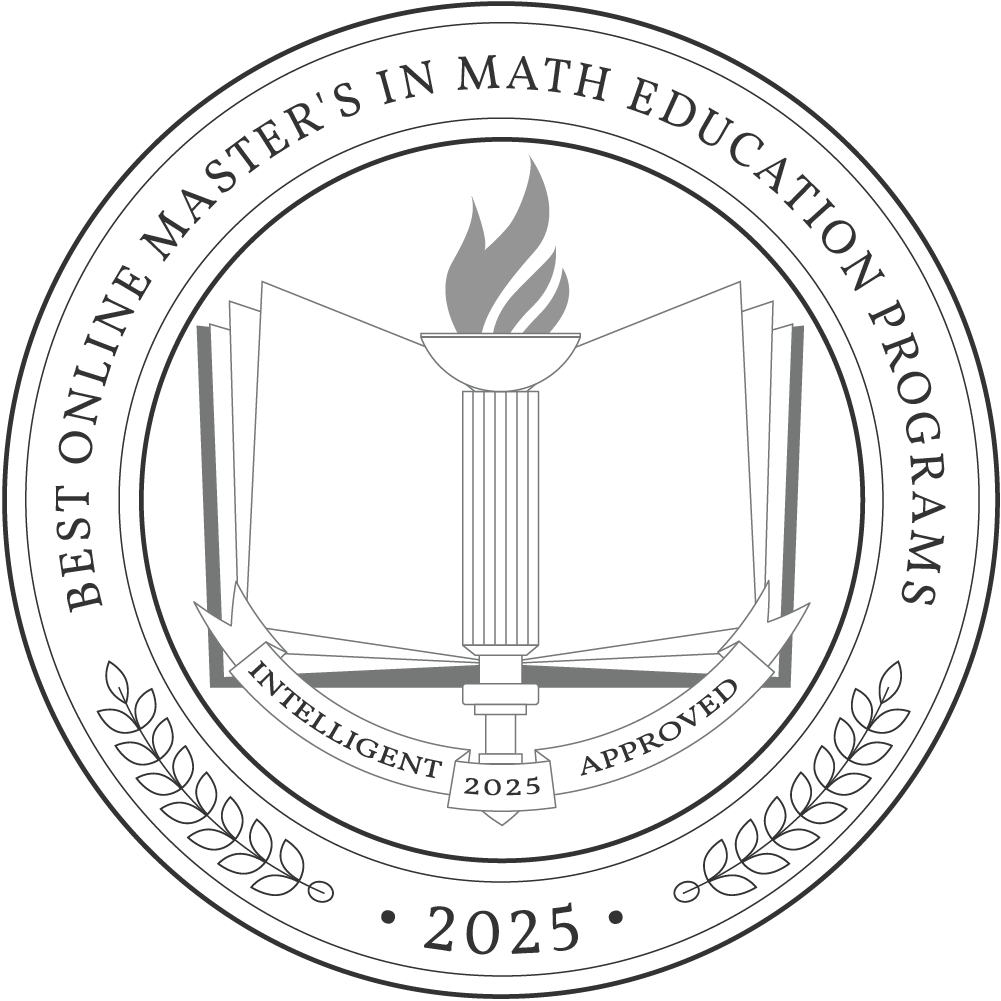An online master’s in math education can help students further their knowledge of mathematics and educational pedagogy. Such programs usually require the completion of 30 to 33 credit hours and can be finished in as little as one year. Afterward, students may qualify for several different jobs, though the general goal of this graduate program is to prepare students to become math teachers.
According to the National Center for Education Statistics, the average annual tuition for a graduate degree is $20,513. Once you graduate, you may choose to become a math teacher at the K-12 level, where you can expect an annual salary of around $65,000 per year.
Why Trust Us
The Intelligent.com Higher Education Team is dedicated to providing students with independent, equitable school and program rankings and well-researched resources. Our expert-driven articles cover topics related to online colleges and programs, paying for school, and career outlooks. We use data from the U.S. Department of Education’s College Scorecard, the National Center for Education Statistics, and other reputable educational and professional organizations. Our academic advisory team reviews content and verifies accuracy throughout the year for the most current information. Partnerships do not influence rankings or editorial decisions.
- Analyzed over 2,000 national, accredited, and nonprofit colleges and universities
- 800+ rankings pages are reviewed and updated yearly
- Content is informed by reputable sources, surveys, and interviews with academic advisors and other experts
- Over 100 data points are reviewed for accuracy and quality throughout the year, including sources
How we rank schools
Our list features the best online Math Education degree programs at top colleges nationwide. Each school featured is a nonprofit, accredited institution — either public or private — with a high standard of academic quality for post-secondary institutions.
We evaluated each school’s program on tuition costs, admission, retention and graduation rates, faculty, reputation, and the student resources provided for online students. We collected data from trusted sources like the National Center for Education Statistics, individual school and program websites, school admissions counselors, and other data sources. Then, we calculated the Intelligent Score on a scale of 0 to 100 based on the following criterion:
Academic Quality:
- Admission rate versus enrollment rate
- Retention rate of students who return after year one
- Accreditation status (regional and programmatic)
- Nonprofit status, both private and public institutions
Graduation Rate
- Overall graduation rate
- Total number of currently enrolled students, including diversity metrics
- Student-to-faculty ratio
Cost and ROI
- In-state and out-of-state per-credit tuition rates and fees
- Required credits to graduate
- Earning potential after graduation
- Availability of federal student loans, scholarships, and other financial aid options
Student Resources
- Available student services for online-only and hybrid programs
- On-campus amenities like tutoring centers and the number of libraries
Read more about our ranking methodology.
Best 20 Accredited Online Master’s in Math Education Programs
FiltersInstitution Type
Status
- Intelligent Score
- Alphabetically By University Name
- Acceptance Rate
- Enrollment
- In-state Graduate Tuition
- Out-of-state Graduate Tuition
- In-state Undergraduate Tuition
- Out-of-state Undergraduate Tuition

East Carolina University
Intelligent Score: 99.45In-state: $4,452
Out-of-state: $20,729
In-state: $4,749
Out-of-state: $4,749
SAT: 1020-1170
ACT: 19-24
Resident: $283
Non-Resident: $1,014
Online, Hybrid
Council for the Accreditation of Educator Preparation
36

Western Governors University
Intelligent Score: 96.35In-state: $6,380
Out-of-state: $6,380
In-state: $7,500
Out-of-state: $7,500
SAT: N/A
ACT: N/A
$408
Online, On-Campus
Northwest Commission on Colleges and Universities
39

Georgia State University
Intelligent Score: 95.37In-state: $7,158
Out-of-state: $22,389
In-state: $7,164
Out-of-state: $7,164
SAT: 1030-1260
ACT: 20-26
In-State: $408
Out-of-State: $1,322
Online
Southern Association of Colleges and Schools Commission on Colleges
36

Hood College
Intelligent Score: 95.34In-state: $41,680
Out-of-state: $41,680
In-state: $8,820
Out-of-state: $8,820
SAT: N/A
ACT: N/A
$510
Online
Middle States Commission on Higher Education
30

University at Buffalo
Intelligent Score: 93.02In-state: $7,070
Out-of-state: $24,740
In-state: $11,310
Out-of-state: $11,310
SAT: 1140-1310
ACT: 23-29
A part-time, online Master of Education in Math Education Studies is offered by the University at Buffalo. This program is intended for students who have substantial math content background but are not seeking New York State teaching certification. The degree takes about two years to complete and stands out for its affordability. It is also unique in that its curriculum focuses heavily on the use of technology in mathematics teaching and learning. Graduates typically go on to careers as researchers, authors, and teachers nationally or internationally and in college settings. Among the admission requirements are a bachelor’s degree, a minimum GPA of 3.0, and computer competency skills.
Resident: $471
Non-Resident: $565
Online, On-Campus
Middle States Commission on Higher Education
33

Northern Arizona University
Intelligent Score: 92.61In-state: $10,243
Out-of-state: $16,248
In-state: $10,309
Out-of-state: $10,309
SAT: N/A
ACT: N/A
$823
Online, On-Campus
Higher Learning Commission
37

Ball State University
Intelligent Score: 92.28In-state: $9,482
Out-of-state: $26,470
In-state: $9,328
Out-of-state: $9,328
SAT: N/A
ACT: N/A
In-State: $464
Out-of-State: $696
Online
Higher Learning Commission
30-32

Nova Southeastern University
Intelligent Score: 90.99In-state: $32,370
Out-of-state: $32,370
In-state: $20,618
Out-of-state: $20,618
SAT: 1030-1240
ACT: 20-27
$1,199
Online
Southern Association of Colleges and Schools Commission on Colleges
36.0

SUNY Brockport
Intelligent Score: 90.86In-state: $7,070
Out-of-state: $16,980
In-state: $11,310
Out-of-state: $11,310
SAT: 860-1060
ACT: N/A
Resident: $471
Non-Resident: $565
Online
Middle States Commission on Higher Education
30

James Madison University
Intelligent Score: 89.96In-state: $7,250
Out-of-state: $23,564
In-state: $10,848
Out-of-state: $10,848
SAT: 1120-1280
ACT: 23-28
Virginia-based James Madison University offers a Master of Education in Mathematics program that welcomes any student with an interest in deepening their understanding of mathematics, including international students. The program is unique because it is designed for secondary teachers of mathematics, but this is not a requirement for admission. It also stands out for its collaborative curriculum that blends courses from both the College of Education and the Department of Mathematics and Statistics. Graduates of this program have gone on to careers as college mathematics instructors and teachers of dual enrollment courses. Of note: The program does not lead to initial licensure as a teacher.
In-State: $561
Out-of-State: $1,291
Online
Southern Association of Colleges and Schools Commission on Colleges
34

Liberty University
Intelligent Score: 89.17In-state: $14,791
Out-of-state: $14,791
In-state: $7,935
Out-of-state: $7,935
SAT: 1040-1250
ACT: 21-29
$415
Online
Council for the Accreditation of Educator Preparation
36

Regent University
Intelligent Score: 88.60In-state: $17,220
Out-of-state: $17,220
In-state: $15,552
Out-of-state: $15,552
SAT: 940-1220
ACT: 21-29
$565
Online
Council for the Accreditation of Educator Preparation
30

East Texas Baptist University
Intelligent Score: 86.30In-state: $26,400
Out-of-state: $26,400
In-state: $6,588
Out-of-state: $6,588
SAT: N/A
ACT: N/A
$415
Online
Southern Association of Colleges and Schools Commission on Colleges
30

Western Illinois University
Intelligent Score: 84.23In-state: $8,712
Out-of-state: $8,712
In-state: $8,156
Out-of-state: $8,156
SAT: 880-1090
ACT: 18-24
US: $386 International: $676
Online
Higher Learning Commission
30

William Carey University
Intelligent Score: 83.17In-state: $12,600
Out-of-state: $12,600
In-state: $11,040
Out-of-state: $11,040
SAT: 1050-1330
ACT: 20-27
$515
Online
Council for the Accreditation of Educator Preparation
30

Northeastern State University
Intelligent Score: 82.72In-state: $5,913
Out-of-state: $14,313
In-state: $4,500
Out-of-state: $4,500
SAT: 955-1125
ACT: 17-24
$279
Online, On-Campus, Hybrid
Higher Learning Commission
35

National Louis University
Intelligent Score: 82.55In-state: $13,419
Out-of-state: $13,419
In-state: $11,646
Out-of-state: $11,646
SAT: N/A
ACT: N/A
$700
Online, On-Campus
Council for the Accreditation of Educator Preparation
33

Fresno Pacific University
Intelligent Score: 82.08In-state: $32,954
Out-of-state: $32,954
In-state: $14,940
Out-of-state: $14,940
SAT: 930-1110
ACT: 16-22
$750
Online, On-Campus
Western Association of Schools and Colleges Senior College and University Commission
30
How to Choose an Online Master’s in Math Education Program
Choose your area of study
This degree is typically offered as a Master of Education (MEd), Master of Science (MS), or Master of Arts (MA). A master’s in math education is a specialized degree designed to prepare future mathematics instructors. As such, online master’s programs usually have two concentrations to choose from: one that prepares students to teach at the K-12 level and one that prepares students to teach at the postsecondary level. If your career goal is to become a college professor, consider pursuing a PhD after completing your master’s to increase your chances of employment.
Research schools and programs
When investigating schools, the first thing to confirm is their accreditation status. This affects whether the school is eligible to award federal financial aid to students. For educators, it can also impact their ability to get the necessary licenses and certifications. Students should seek out schools with regional accreditation as well as accreditation from the Council for the Accreditation of Educator Preparation (CAEP).
Once students have narrowed things down to a few schools they are interested in, they should inquire about the job placement rate for graduates. While online programs mean students can take classes anywhere, it may be important to consider universities close to where students would like to teach, as the choice of alma mater may ultimately help them to land a job in their desired area.
To learn more about any schools that you’re interested in, you can visit the school’s website, contact an admissions counselor, follow the school on social media, or attend an in-person or virtual open house.
Prepare for tests and applications
Application requirements vary by school and program.
While some online master’s in math education programs have waived the requirement, the majority of them will require that students submit GRE scores as part of the application. It’s essential to consider application deadlines when preparing for the GRE because it takes some students as long as three months to prepare for the test and up to 15 days to receive the results.
Undergraduate transcripts, test scores, letters of recommendation, and a personal statement are also often required. Always contact an admissions counselor to ensure you have the most accurate information regarding requirements and deadlines.
Select your program
Ultimately, selecting the best program for an online master’s in math education will come down to where students want to go, how much the program costs, and their test scores. It’s not uncommon for students to apply to multiple programs, so they still have options if they do not get into their top pick.
Before making your final decision, review your needs and goals again. Do you plan to attend school full-time or part-time? Do you want your program to be as online as possible, or are you fine with a hybrid program that has a fair amount of in-person requirements? Some programs offer asynchronous courses, which can be completed at your own pace, while others only offer synchronous courses, which involve remotely attending lectures and completing assignments at the same time as other students — which of these two online learning formats do you prefer? Your school should accommodate your scheduling needs and learning preferences.
Determine how you’ll pay for your degree
Once students know how much the graduate program will cost, they need to explore ways of paying for it. You should fill out the Free Application for Federal Student Aid (FAFSA) each academic year. It helps students receive federal loans and other potential assistance that may help pay for educational costs.
Additionally, exploring any scholarships available from the school in question or various local, state, and national groups is advisable. Those who already work in the field should see if their employer offers tuition assistance benefits as well. With these resources, you may even be able to earn your doctorate for free.
Be sure to speak to financial aid counselors at the schools you’re interested in for the most accurate and specific information about program cost.
What Can You Expect from an Online Master’s in Math Education Program?
In an online master’s in math education program, the courses combine math and education classes. On the math side, students can expect to study concepts like applied mathematics, probabilities, and statistics. On the education side, courses typically cover elementary and secondary education. However, if the program focuses on postsecondary education, these courses will address developing a pedagogy to teach college students.
How fast students complete this degree largely depends on whether they entirely focus on their studies or are studying part-time while holding down a full-time job. For example, a full-time student may complete their studies within 18 months, and there are accelerated programs that allow students to finish in as little as one year. Most of the time, though, this program takes about two years to complete, and you typically don’t have to meet any residencies that might otherwise delay your graduation.
Potential courses you’ll take in an online master’s in math education program
- Cognition and Critical Thinking. Students learn how to use Bloom’s taxonomy and other methods to learn more about the thinking and judgment behind our decisions. This class also deals with how our psychology informs our everyday critical thinking.
- Design of Learning Environments. Future mathematics instructors learn more about creating an environment most conducive to student learning. This course covers in-person and online teaching strategies and the skills required for each path.
- The Known Equation. The Known Equation reinforces existing knowledge while building upon what students already know. Students will learn about the Pythagorean theorem, the quadratic formula, and many more concepts as they explore the links between theoretical and applied knowledge.
- Mathematical Modeling Methods. This course is about applying different mathematical models to various theories to solve practical problems, including theories regarding differential equations and statistics, game theory, and chaos theory.
What Can You Do With an Online Master’s in Math Education?
Career outlook
Graduates with an online master’s in math education have diverse career paths available, extending beyond traditional teaching roles. Here are some common occupations for individuals with this degree:
- Kindergarten or elementary school teacher — Teach subjects such as reading, math, and social studies to young children.
- Median annual salary: $63,670
- Projected employment growth (through 2032): 1%
- New job openings projected: 109,000 annually
- Middle school teacher — Help students advance their understanding of the subjects they learned in elementary school and prepare them for the subjects that will be covered in high school.
- Median annual salary: $64,290
- Projected employment growth (through 2032): 1%
- New job openings projected: 42,200 annually
- Instructional coordinator — Develop, implement, and assess the effectiveness of educational materials.
- Median annual salary: $74,620
- Projected employment growth (through 2032): 2%
- New job openings projected: 19,200 annually
Online Master’s in Math Education Degree Frequently Asked Questions
How do I apply to an online master’s in math education degree program?
In most cases, students can apply to the school(s) of their choice directly through the school website. The website should also specify various requirements, including if GRE scores are needed, where to send transcripts, whether applicants need to submit letters of recommendation, etc.
Additionally, students should always speak to an admissions counselor beforehand. Not only can a counselor verify what students do (and don’t) need to submit as part of the application, but they can also answer any questions students may have in precise detail.
How much does an online master’s in math education degree cost?
While the exact cost of each program may vary, students can generally expect to pay between $18,000 and $35,000 in total tuition to earn an online master’s in math education. Public schools are typically on the lower end of that range, and private schools are typically higher.
How long does it take to earn an online master’s in math education degree?
Most online master’s in math education programs require 36 credit hours. These online programs can typically be completed over two years, though it may take longer for students to get their degrees if they balance their education with a full-time career. Those who can entirely focus on their studies may be able to complete the program in 18 months, and some schools offer accelerated programs students can complete in just one year. In many cases, the time required to complete the program may influence your choice of school.
Is an online master's in math education worth it?
Earning an online master’s degree in math education offers numerous advantages. Online master’s programs in math education typically provide educators with advanced knowledge in math instruction, curriculum development, and educational leadership. An online format allows flexibility for working professionals to enhance their skills while continuing to teach. Graduates gain the expertise to take on leadership roles, contribute to curriculum improvement, and impact the quality of math education in their communities.
Online education eliminates geographical barriers, providing access to reputable programs and expert faculty regardless of location. This accessibility broadens educational opportunities for individuals who may not have access to certain programs locally.
Read More About Online Master’s in Math Education Degree Programs
Compare School Options
Related Degrees
- Higher Education
- Graduate Certificate in Elementary Education
- Elementary Education
- Physical Education
- Teaching
- Educational Leadership
- Math Education
- Gifted and Talented Education
- Child Development
- Curriculum and Instruction

